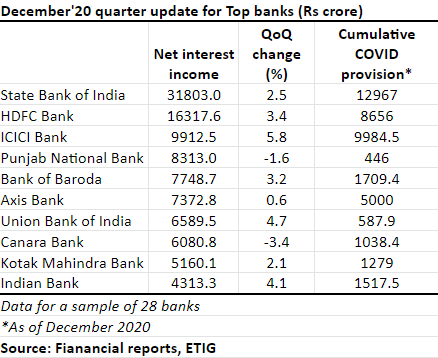State-owned
Punjab National Bank (
PNB) is expecting to recover a substantial Rs 3,800 crore from
Bhushan Power and Steel under debt resolution in NCLT, which will help it achieve the target of Rs 8,000 crore cash recoveries during this fiscal, its managing director and CEO
S S Mallikarjuna Rao said.
Besides, the city-based lender also hopes to make good recovery of its exposure in crisis-hit DHFL, which is undergoing a resolution process currently.
Sticking to the bank’s previous guidance on restricting the gross NPAs below 14 per cent and net NPAs lower than 5 per cent by the end of the current fiscal, Rao said there has been an improvement in collection efficiency as well in January after a dampened December.
Across the banking industry, the collections were much better in October and November, before dampening again in December because of lack of clarity on NPA recognition from the Supreme Court, he added.
In response to a public interest litigation during Covid times, the Supreme Court had passed an interim order in September, directing banks not to declare accounts as NPA, which otherwise would have turned dud, during March-August till further orders.
“So there was an impulse on identification on NPA. However, the collections have again improved in the month of January across the banking industry, including our bank. Considering, these factors, we are very confident that there won’t be any further increase (of bad loans). About pro-forma NPA, we have already marked them, we have identified and have done the complete provisioning, so there won’t be any impact in Q4 (FY21),” Rao said in a conference post bank’s December quarter results.
“On the contrary, I am expecting reduction of the proforma NPA what we have declared as on December 31, 2020.”
The bank has posted a net profit of Rs 506 crore on a standalone basis in the quarter ended December 2020 of this fiscal. It had posted a net loss of Rs 492.28 crore in the year-ago period.
The lender also cut down on its gross non-performing assets (NPAs) to 12.99 per cent by the end of the December quarter from 16.30 per cent in the year-ago period. While, net NPAs reduced to 4.03 per cent from 7.18 per cent.
Rao said the recovery from smaller accounts have been better, if not very good, as there was a dampening spirit in December.
“Recoveries are better in January, it will be definitely on the expected lines up to March. Last time, I had given guidance of recovery of about Rs 8,000 crore through reduction (by way of resolution) in NCLT cases. So we will await as there are big accounts… Bhushan Power is one account where we are anticipating cash recovery of Rs 3,800 crore. And DHFL is also there where bidding (for resolution of NPA) has been completed very recently. There also we expect a good amount of recovery,” Rao said.
So these two things (Bhushan Power & Steel Ltd and DHFL) together will be able to achieve the expected target what we were anticipating in terms of NCLT (National Company Law Tribunal), he added.
In June, the chief of the country’s second largest public sector lender had said that PNB expects to make recoveries worth Rs 8,000 crore in 2020-21.
On the NPA situation, Rao said as the bank has already identified those accounts which otherwise could fall into NPA category and its bad asset numbers would have been different and has made provision accordingly, there won’t be any change in its earlier stance of restricting gross and bad loan ratios below 14 per cent and 5 per cent, respectively.
“So, our guidance is what we have given last time also. We would like to retain the net NPA below 5 per cent by March and we would like to retain the gross NPA 14 per cent… January appears to be much better in terms of collections. So I am very confident that we will be able to control the NPA,” Rao said.
